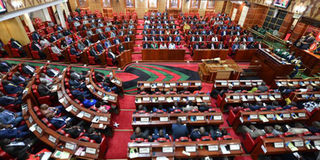Breaking News: At least 10 feared to have drowned in Makueni river
MPs change tack in pursuit of higher salaries

President Uhuru Kenyatta addresses Parliament on September 12, 2017 during its official opening. MPs are seeking to increase their incomes. PHOTO | RAPHAEL NJOROGE
What you need to know:
- Justice George Odunga temporarily barred the SRC from implementing the reduced salaries for MPs.
- Their salaries were fixed at Sh621,250 and sitting allowances for committee meetings fixed at a maximum Sh80,000 for members and Sh128,000 for chairpersons.
The Parliamentary Service Commission’s decision to challenge the reduction of MPs’ salaries in court has marked a change in the legislature’s strategy as it seeks to protect MPs’ salaries.
While MPs would in the past force their way to higher salaries — and in 2013 did so to secure uncapped allowances — the route taken this time means that the decision that comes out is backed by law.
The case is set for hearing on January 29, 2018 and means that Kenyans are yet to see the end of their elected representatives’ fight for higher pay, even as it is seen as an unwarranted and a greedy move.
POOR SERVICE
As MPs revolted against the list of MPs in the Parliamentary Service Commission for the current Parliament, the complaint on the lips of many was that the MPs in the last commission did not do much to spare MPs the reduction of their salaries.
Kajiado Central MP Kanchori Memusi was scathing in his criticism of past members of the commission, some of whom had been nominated back by their coalitions:
“I would like to say that those Members who served in the last PSC left Members vulnerable and as beggars.”
PAYSLIP
Already, Parliament secured a first victory two weeks ago when Justice George Odunga temporarily barred the Salaries and Remuneration Commission from implementing the reduced salaries for MPs.
The official establishment at Parliament has remained tight-lipped on how this order would affect the salaries and allowances due to be paid at the end of this month.
“We’ll only tell for sure when we see our payslips for this month. We are yet to be paid,” one lawmaker said on Tuesday.
Because it is a sensitive matter with an amount of political risk, the MP asked not to be named.
CAR GRANT
It is not clear to most MPs whether they will be paid the Sh710,000 that the 11th Parliament paid legislators in their last year in office, the Sh532,500 that was paid to those legislators in their first year or the Sh621,250 stated by the SRC in July.
MPs have been quietly asked to pick forms for the Sh5-million car grant they used to enjoy before the SRC — which is without commissioners for now as their term has ended — reduced their salaries.
The grant of Sh5 million was replaced with a provision for a loan of up to Sh7 million, meaning that MPs would no longer be entitled to “free money” to buy cars.
ALLOWANCES
The amount they are reimbursed for travelling to their constituencies was also capped at a maximum of Sh738,833 for those who travel farthest from the capital city.
Their salaries were fixed at Sh621,250, plenary sitting allowances removed and sitting allowances for committee meetings fixed at a maximum Sh80,000 for members and Sh128,000 for chairpersons.
Earlier in the year, Speaker Justin Muturi signalled a turn-around in the manner Parliament interacts with the Judiciary when he asked a committee to heed a court order rather than defy it as the National Assembly has done in the past.
This was in the case where the National Assembly was scrutinizing a petition for the removal from office of Auditor General Edward Ouko.
EDWARD OUKO
Mr Ouko and activist Okiya Omtatah had separately secured orders for the Finance, Trade and Planning Committee to stop their consideration of the petition by Emmanuel Mwagonah before the case challenging it was determined.
Mr Muturi asked the Finance Committee to suspend its scrutiny of the petition and told MPs that Parliament had decided that the battle is best fought in court.
Mr Ouko scored another victory when the court in September quashed the proceedings of the committee, Justice Odunga ruling that the proceedings failed the test of fair administrative action.
Parliament can still summon the Auditor General, the judge ruled, but it must follow the law.





